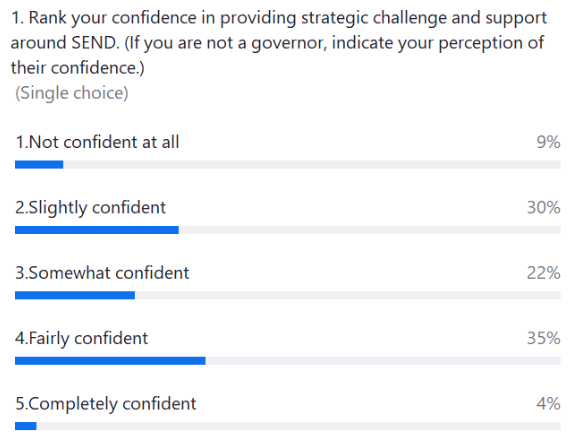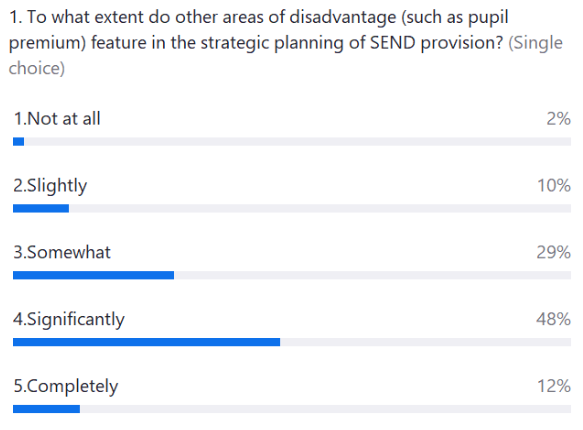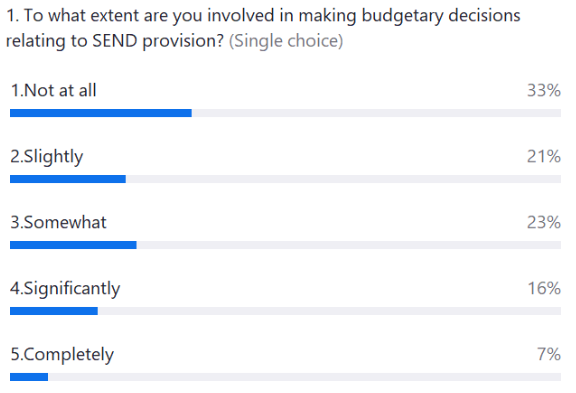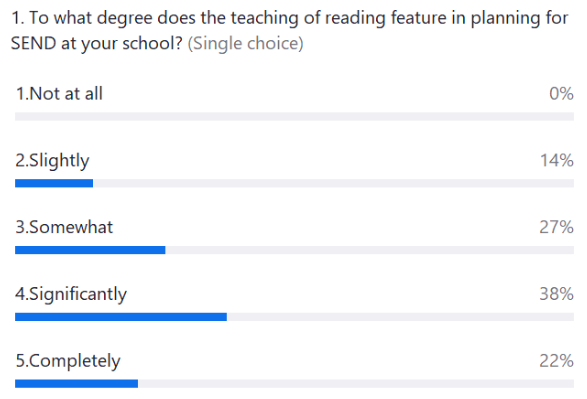SEND Governance - Supporting your School when Resources are Tight
_1000.png)
This blog is based on Judicium’s Safeguarding ‘Sofa Session’ from the 20th of November, with our resident expert Rik Chilvers. This session focused on how SEND governors can support other governors and leaders to maximise existing resources, how they can work with leaders to maintain a data-driven approach to resource use, and helping governors to use their links with the community to support the school.
Poll 1

SEND Governance
SEND is a complex topic. In our last Sofa Session for governors, we covered some of the key areas of knowledge, such as an introduction to the statutory guidance and laws that guide the implementation of SEND support and some of the areas and types of need.
Judicium's SEND service includes training for governors, which aims to give them the necessary skills and knowledge to effectively manage the provision for children with SEND in their setting.
Getting your SEND provision right - ensuring that you meet the needs of all children with SEND, whether or not they have an EHCP - is a challenging task. It is important to consider the current landscape for SEND provision.
School and Trust Governance Survey 2024 Key Findings
-
Only 19% of schools and trusts perceive themselves as financially sustainable in the medium to long term, with deep-seated concerns about future financial viability growing more severe.
-
Access to funding is the top SEND challenge, reported by 74% of governing boards – up from 66% last year.
-
The proportion of boards identifying support for children with special educational needs as a top challenge has risen dramatically to 37%, from 25% in 2022, reflecting the increasing complexity of needs in classrooms.
-
Attendance features prominently as both a top challenge (32%) and a key strategic priority (33%) for governing boards, underscoring its critical importance in the current educational landscape.
-
Half of respondents (51%) said there has been an increase in the support provided by their school or trust in response to wider societal needs in the past 12 months.
The Government’s Approach to Improving SEND Provision
Since the introduction of the new Labour government, minsters have hinted at their vision for how to improve provision for children with SEND in mainstream schools.
Recently ,the Department for Education released a report which suggests that, with improved early intervention and better resources in mainstream schools, the special educational needs of tens of thousands more pupils could be met without requiring an EHCP. This follows a report from the National Audit Office urging the government to consider a significant overhaul of the SEND system, noting it is currently financially unsustainable. In a further indication of how important SEND provision has become for schools, 73% of trust leaders have identified inclusion and SEND provision as their main area of focus in the next academic year.
It's not surprising the government is looking for ways to improve outcomes without spending more money on EHCPs. Whether or not you agree on the government’s approach, it’s helpful to see their direction of travel, especially since Ofsted will be instructed to have a renewed focus on inclusion.
Catherine McKinnell, the schools minister, said Labour’s plans included “strengthening accountability for mainstream settings to be inclusive, for instance through Ofsted, and helping the mainstream workforce to have SEND expertise.”
Currently SEND is considered, but Ofsted doesn't grade SEND separately. Inspectors use what they've seen of your SEND provision to inform their judgements in other areas including the intent, implementation and impact of quality of education, behaviour and attitudes, personal development and leadership and management. If Ofsted considered SEND separately, as they do for safeguarding, there will be significantly more pressure on schools to ensure their provision is excellent.
What Can Governors do to Help?
The role of a governor
Although the SENDCO leads the provision of SEND in a school, like safeguarding, SEND is everyone’s responsibility. That means every member of a school’s governing body is accountable for securing high-quality outcomes for children and young people with SEND.
More broadly, the DfE’s governance guide identifies the following features of the strategic leadership governors should bring to schools:- Setting and defining the school’s strategic direction, including its vision and strategic priorities.
- Setting and modelling the school’s culture, values and ethos.
For trustees, the Confederation of Schools Trusts states:
Governance in school trusts has a broad and critically important mandate and addresses strategic leadership, accountability and assurance as well as stakeholder engagement. The board has collective accountability and strategic responsibility for the trust. It has a focus on ensuring the trust delivers an excellent education to pupils while maintaining effective resource management and must ensure compliance with the trust’s charitable objects, regulatory, contractual, and statutory requirements.
Providing a high level of strategic leadership around SEND requires governors have detailed understanding of the challenges children and their families face as well as a solid grounding in the local and national structures in place to support the school. This is why we created Judicium's SEND service. We want to ensure all governors feel equipped with the necessary information to strategically support their school. Our audit reports include an action plan with urgency indicators and a timeframe for completion, enabling governors to provide effective challenge.
Setting an action plan
We recommend governors support SENDCOs and senior leaders to create a SEND action plan, even if the school’s SEND priorities are listed in the school development/improvement plan. This is to facilitate the document being more easily edited, adapted with more specific and additional targets as needed and to provide the SENDCO with increased ownership. However, it should still draw upon the priorities set across other areas of the school.
Meeting the SENDCO and visiting the school
It’s crucial governors meet regularly with the SENDCO. This can be virtually, but governors should visit the school in person at least once a year to triangulate what they’re told with information from students, staff and parents.
Document review
At this time of year, many governors will be reviewing their school’s SEND Policy and SEND Information report. The policy should set out your aims and principles for supporting children with SEND. The information report details the implementation of this , i.e., it reflects practice. Reviewing these key documents should provide you with an opportunity to consider how SEND provision may be affected by changes across the school, such as in budgets and resourcing.
Considering SEN alongside other areas of disadvantage
Governors need to strategically consider how SEND intersects with other forms of disadvantage.
Poll 2

Pupil Premium
On a national scale, there is an established link between SEN and deprivation. It is estimated that 30% of children with SEN benefit from pupil premium funding. It is therefore vital governors consider these areas in tandem. Governors should consider developing their understanding of:- The impact of socioeconomic disadvantage on learners with SEN in your school.
- How governors can work closely with the families of disadvantaged pupils to understand their needs.
- How the school aims to address the impact of socioeconomic disadvantage on learning, and how governors can evaluate how successfully the school is achieving this.
Looked After Children
Around 70% of looked after children have SEN. All maintained schools and academies must appoint a Designated Teacher for looked after children who should work closely with the SENCO to ensure that the implications of a child being both looked after and having SEN are fully understood by relevant school staff.
Governors can support in this through:- Requesting analysis of progress data for these children.
- Reviewing the strategy behind the choice of interventions running in their school and how they support LAC who have SEN.
Saving money through data analysis
Poll 3

The Code of Practice (para 6.97) states that:
The SENCO, headteacher and governing body or proprietor should establish a clear picture of the resources that are available to the school. They should consider their strategic approach to meeting SEN in the context of the total resources available, including any resources targeted at particular groups, such as the pupil premium.
With resources tight now, many schools are unable to recruit the number of support staff they may have done previously. It's therefore crucial governors are working closely with their SENDCOs to understand data such as:- the proportions of particular needs within the school
- the progress and attainment of children with SEND
- the attendance of children with SEND
- what the behaviour of children with SEND was like
- any trends in the above data
This enables strategic spending decisions, linked to other priority areas governors will be aware of around hiring, resourcing and support. For example, it can guide how CPD is used to upskill teachers to reduce their reliance on TAs, and thus freeing support staff to deliver targeted interventions.
Poll 4

Focus on reading
Ofsted wants to know that leaders are tightly focused on supporting pupils who need extra help to learn to read. In their words, there should be 'rigorous approach to the teaching of reading,' which suggests meaningful opportunities to practice and develop reading must be embedded into the curriculum, any targeted reading support is delivered by appropriately trained staff, and the impact of universal and targeted reading provision is regularly reviewed.
Community links
All this strategic support needs to be grounded in the community the school serves. With that in mind, we recommend governors engage with parents/carers as much as possible. This means attending some parents' evenings or events such as coffee mornings with the aim of gathering direct feedback about the school's SEND provision from parents of children with SEND.
Pupil Disciplinary Committee (PDC)
The most operational governors are likely to get in relation to SEND at their school is when considering a headteacher's decision to suspend or permanently exclude a child.
The guidance states:
Concretely, what this means is that governors will convene in a meeting - often called a pupil disciplinary committee (PDC) - to consider whether to reinstate the pupil. This decision should consider the interests and circumstances of the pupil, their peers, staff and the school community.
Clearly, governors will want to know that the school has met any SEND that the pupil may have before deciding to suspend or exclude them. The scrutiny that governors bring to PDCs should dovetail with their reviews of school data.
Takeaways
- Meet regularly with the SENDCO
- Create an action plan
- Use data to inform strategic planning for SEND
- Ensure that reading is baked into all areas of the curriculum
- Build links with your community to better understand the provision available to children with SEND in your school
Additional Info
Maintained schools governance guide
Academy trust governance guide
Independent schools governance guide
If you are interested in some more live SEND training why don't you check out what else we have coming up here.
What do Ofsted Look for when Inspecting for SEND Provision and Leadership?
If you require any SEND support in any of these steps or would like to talk to someone surrounding our SEND Support Service for your school, please do not hesitate to call us on 0345 548 7000 or email georgina.decosta@judicium.com
You can follow us on Twitter: @JudiciumSG @JudiciumEDU
If you’d like to review all of Judicium’s forthcoming sofa sessions please click here
© This content is the exclusive property of Judicium Education. The works are intended to provide an overview of the sofa session you attend and/or to be a learning aid to assist you and your school. However, any redistribution or reproduction of part or all of the contents in any form is prohibited. You may not, except with our express written permission, distribute or exploit the content. Failure to follow this guidance may result in Judicium either preventing you with access to our sessions and/or follow up content.
Related content
.png)
This blog is based on Judicium’s Safeguarding ‘Sofa Session’ from the 9th of July, with our resident expert Rik Chilvers
.png)
This blog explores how school leaders can develop SEND provision; when the right strategies are applied, leadership teams can build inclusive, confident, and impactful SEND provision that benefits every pupil.
.png)
This blog is based on Judicium’s SEND ‘Sofa Session’ from the 21st of May, with our resident expert Rik Chilvers.
.png)
This blog is based on Judicium’s SEND ‘Sofa Session’ from the 26th of March, with our resident expert Rik Chilvers.

This blog is based on Judicium’s SEND ‘Sofa Session’ from the 11th of December, with our resident expert Rik Chilvers.

As the pressure on schools increases, we need to examine the current challenges and reflect on actions that ensure every child, regardless of their strengths and needs, has access to the education they deserve. The impact this is having on the whole school community is already apparent, but how do schools and academy trusts even begin to address this?

Sofa Sessions | SEND